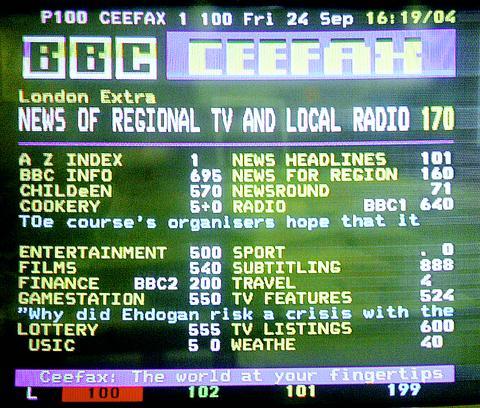Whether seeking the temperature in Caracas, the score of the latest England versus Australia cricket match or how to steam cook haddock, there is one place that millions of Britons turn to.
And it is not the Internet, but cyberspace's predecessor, Ceefax, which celebrates its 30th anniversary this month. More than 20 million viewers in the UK tune into the huge encyclopedia of information each week by typing three-digit codes at their television screens using their remote controls.

PHOTO: AFP
"The world at your fingertips," runs a banner at the bottom of Ceefax's main index page.
The service, available on terrestrial channels run by the BBC, emerged 30 years ago as engineers of the public broadcaster sought ways of providing on-screen subtitles for the deaf watching television shows.
Engineers found that a normal television picture had spare lines at the top of the screen that could be used to transmit words or numbers and thus Ceefax, a pun on "see facts," was launched on Sept. 23, 1974, providing viewers with written facts on their television sets.
Hailing Ceefax's landmark, British Secretary of State for Culture, Media and Sport Tessa Jowell described the service as the "precursor to the Internet news revolution."
"It still provides a distinct and unique service that many millions use," she said.
Viewers using Ceefax can access each of more than 1,000 pages in just a few seconds, whether it is to see world news headlines (page 101), the latest share prices in London (221) or English Premiership football headlines (302).
"This is still the number one means of finding information," a Ceefax fan known only as Keith told BBC News online.
"It beats the Internet, if you have it, hands down for speed and ease of use ... Most information can be displayed on the screen quicker than the time it takes a personal computer to boot up," he added.
Famous sports personalities have even admitted to feverishly checking Ceefax to see whether they have been selected to play for England's football, rugby or cricket squads before receiving confirmation from their coaches.
Unlike the Internet, Ceefax is unable to incorporate flashy graphics. The service's presentation has changed little in 30 years, restricted to using a series of square blocks to draw pictures in only a maximum of seven colors on a black background.
Unfortunately for the millions of Ceefax fans, the service won't make its 40th birthday, let alone its 60th. Ceefax in its current format is set to end in 2012 once the UK's terrestrial television channels switch over from an analogue signal to digital.
A service similar to Ceefax already exists on the BBC's digital channels, but viewers access news and other information using menus rather than numbers.
The government wants to switch the country completely to digital television to free up broadcast frequencies and to encourage technology that allows a greater number of channels and clearer signals.

The Eurovision Song Contest has seen a surge in punter interest at the bookmakers, becoming a major betting event, experts said ahead of last night’s giant glamfest in Basel. “Eurovision has quietly become one of the biggest betting events of the year,” said Tomi Huttunen, senior manager of the Online Computer Finland (OCS) betting and casino platform. Betting sites have long been used to gauge which way voters might be leaning ahead of the world’s biggest televised live music event. However, bookmakers highlight a huge increase in engagement in recent years — and this year in particular. “We’ve already passed 2023’s total activity and

Nvidia Corp CEO Jensen Huang (黃仁勳) today announced that his company has selected "Beitou Shilin" in Taipei for its new Taiwan office, called Nvidia Constellation, putting an end to months of speculation. Industry sources have said that the tech giant has been eyeing the Beitou Shilin Science Park as the site of its new overseas headquarters, and speculated that the new headquarters would be built on two plots of land designated as "T17" and "T18," which span 3.89 hectares in the park. "I think it's time for us to reveal one of the largest products we've ever built," Huang said near the

China yesterday announced anti-dumping duties as high as 74.9 percent on imports of polyoxymethylene (POM) copolymers, a type of engineering plastic, from Taiwan, the US, the EU and Japan. The Chinese Ministry of Commerce’s findings conclude a probe launched in May last year, shortly after the US sharply increased tariffs on Chinese electric vehicles, computer chips and other imports. POM copolymers can partially replace metals such as copper and zinc, and have various applications, including in auto parts, electronics and medical equipment, the Chinese ministry has said. In January, it said initial investigations had determined that dumping was taking place, and implemented preliminary

Intel Corp yesterday reinforced its determination to strengthen its partnerships with Taiwan’s ecosystem partners including original-electronic-manufacturing (OEM) companies such as Hon Hai Precision Industry Co (鴻海精密) and chipmaker United Microelectronics Corp (UMC, 聯電). “Tonight marks a new beginning. We renew our new partnership with Taiwan ecosystem,” Intel new chief executive officer Tan Lip-bu (陳立武) said at a dinner with representatives from the company’s local partners, celebrating the 40th anniversary of the US chip giant’s presence in Taiwan. Tan took the reins at Intel six weeks ago aiming to reform the chipmaker and revive its past glory. This is the first time Tan